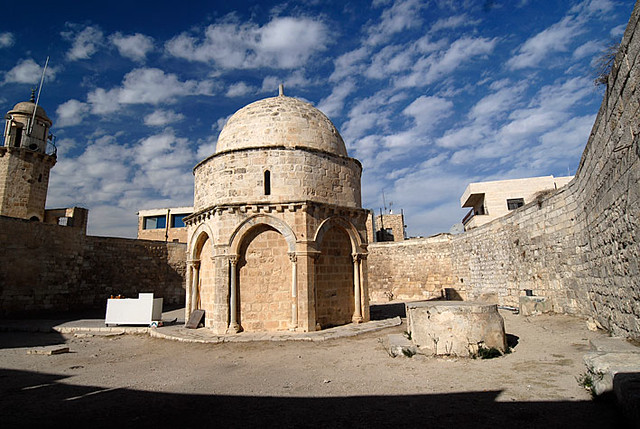Growing up in Kent, in a Christian family, the story of how St Augustine brought Christianity back to England seems to have been genetically implanted in me. Today, I am happy that we celebrate the feast of St Augustine, the
Apostle to the English, who died around this date in 604. But we should be neither nostalgic nor purely academic when we remember this great saint. Instead, I believe St Augustine provides us with a powerful example of Christian witness in difficult circumstances. Just as he brought Christianity from Rome to the pagan Anglo-Saxons, who had displaced Roman British Christianity, English Catholics today have the task of re-evangelising our drifting post-Christian culture in the early 21st century.
 |
| Saints Gregory and Augustine |
And what exactly is Augustine's story, and how is it relevant to us? Although we call him Augustine of Canterbury, he was originally a Roman monk. His early life is obscure and he first comes to notice as a member of the Benedictine community established by St Gregory the Great on his own family estate on the Cælian hill. It is Gregory who takes the principal role in establishing the English mission. He seems to be personally concerned that, despite its remoteness, Britannia has been part of the Roman Empire and therefore deserves to be restored to the Catholic faith. He knows little, it seems, of the British church still surviving on the Celtic margins. But these Christians lack vital connections with the Apostolic See, celebrate Easter on a different day, and have made no effort to evangelise the Anglo-Saxons. As a result, the potential converts among the pagans will have to be won by a direct mission from Rome.
Augustine is Prior of his community and has shown himself an able superior. So, in 596, Gregory chooses him to lead a band of monks to bring the Gospel north. They are to convert the king of Kent, Ethelbert, whose wife Bertha is of Frankish origin and already a Christian; to preach for the conversion of the Kentish people; and to establish monasteries and schools. At this point, we see another side of Augustine's character. Not long after leaving Rome, he and his brethren begin to get cold feet and want to go home. 'For they were appalled at the idea of going to a barbarous, fierce and pagan nation, of whose very language they were ignorant', we are told by St Bede (
HEGA 1.23). But Pope Gregory sends Augustine back on his way, urging him that 'it had been better not to undertake any high enterprise than to abandon it once begun' (
Ep. VI, 50a). Augustine obeys.
 |
| Augustine preaching to Ethelbert |
Their target, King Ethelbert, is a formidable man. As
Bretwalda (overlord) over several Anglo-Saxon kings, his authority stretches as far north as the Humber, and he will reign in Kent for 56 years. No doubt, his wife exercises a certain influence over him which ensures a decent welcome to the missionaries. But Ethelbert is a god-fearing pagan and, superstitiously believing that Augustine might try magic on him, insists on meeting the monk in the open air. Such fears are disarmed by Augustine's prayerful and peaceable manner. The king remains cautious and does not immediately convert. But that meeting on the isle of Thanet results in his offering the missionaries provisions and property to establish themselves in his capital, Canterbury, and the freedom to preach to the people. Soon, the people are coming in droves to be baptised, inspired by the apostolic example of the fledgling Christian community. As Bede reports, the missionaries 'regarded worldly things as of little importance and accepted only the necessities of life from those whom they taught. They practised what they preached, and were willing to endure any hardship, and even to die for the truth which they proclaimed.' (
HEGA 1.26) Compare this with the cowardly band that left Rome just a few months previously, and you begin to see the extraordinary grace of God at work in these men.
It reminds me of the early Dominican brethren who, six centuries later, would meet with similar success across Europe. The simplicity of their lives and their gospel zeal – these two attitudes can be seen in the pattern set by Augustine for the early English church, and both are relevant to us today. Of course, Augustine was not perfect. Some historical discussion, for instance, revolves around his meeting with the bishops of the old British church, in which he offended them by remaining seated, whereas they had been looking for a sign of his humility. His attitude was appropriate, perhaps, given his apostolic authority from Rome, but it was a regrettable diplomatic
faux pas. Such initial tensions would then be sustained by wider political circumstances.
After his death, Augustine was quickly recognised as a saint and his cult developed at the shrine in his abbey in Canterbury. Sadly, that was destroyed in the Protestant Reformation, but happily a
new national shrine of St Augustine has been established as recently as 2012, in a beautiful church by Pugin, not far from the spot where Augustine first landed.
Sancte Augustine, ora pro nobis.-----
Historical Note
 |
The Angles in Rome: the blonde hair hypothesis
(opus sectile in Westminster Cathedral) |
Of course, I've left out the most famous episode in the Gregorian mission. Before becoming pope, Gregory saw some boys or youths of fair complexion being sold in the market. Hearing they were 'Angles', he is famously said to have replied,
Non Angli, sed angeli. Not Angles, but angels! In fact, the accounts in Bede and in the
Whitby Life of Gregory the Great record a whole series of witticisms. The line about angels was originally longer: 'they have angelic faces, and it is right that they should become joint-heirs with the angels in heaven'. (
HEGA 2.1) Then, since their king was called Aelli, so '
Alleluia, God's praise must be heard there.' Finally, on being told that their tribe was called Deira, Gregory quipped, 'They shall flee from the wrath of God (
de ira dei) to the faith.' (
Whitby Life, ch. 9)
And, for bonus points, there is a little detail that often gets misreported. The boys or youths were
not 'fair-haired', as many modern accounts say. The text in Bede certainly says they had fair skin (
pueros...candidi corporis) but their hair he describes as 'remarkable heads of hair' or 'beautiful hair'. The Latin says
capillorum...forma egregia – what we might call 'an impressive shock of hair'! Nothing there about being blonde.













